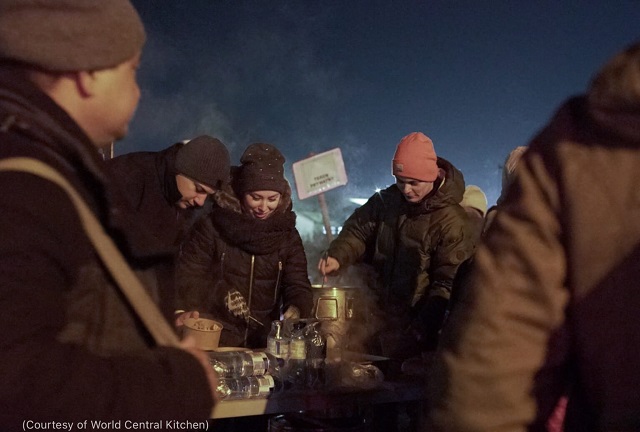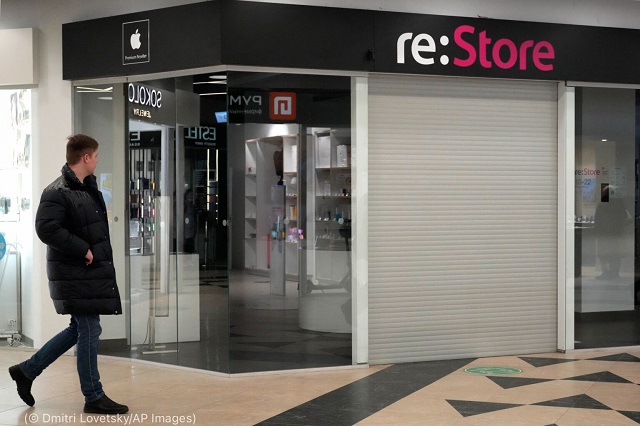As the world denounces Vladimir Putin’s unprovoked attack on Ukraine, the private sector in the United States is showing its support for Ukraine in a number of ways.
U.S. tech company Microsoft detected a Russian malware alert in Ukraine on the eve of the Russian government’s invasion. Within hours, protective code was shared with the governments of Ukraine, Poland and other European allies, which thwarted a potentially catastrophic cyberattack.
“I’ve never seen it work quite this way, or nearly this fast,” Microsoft’s senior cybersecurity executive Tom Burt told the New York Times. “We are doing in hours now what, even a few years ago, would have taken weeks or months.”
When Washington chef José Andrés heard about the crisis unfolding in Ukraine, he took his nonprofit organization World Central Kitchen to help feed Ukrainian refugees who were crossing the border into Poland, Romania, Moldova and Hungary.

Recent arrivals to the Poland/Ukraine border enjoy hot soup and tea from World Central Kitchen February 26. (Courtesy of World Central Kitchen)
“We’re here to support everybody and empower them like we do everywhere we go,” Andrés told the Washington Post.
World Central Kitchen is also providing resources to help restaurants in Odesa and Lviv feed local people who have stayed in Ukraine. Andrés says he’s trying to figure out a way to get flour to nuns in Lviv who are feeding their community.
Similarly, U.S. housing rental company Airbnb has made free rentals available to 100,000 Ukrainian refugees across Europe. And U.S. retailer Etsy has excused all $4 million of outstanding debt from Ukrainian creators.
Halting business in Russia
Many U.S. companies are severing ties with Russia and refusing to engage with the Russian government’s economy.

A closed re:Store, an official Apple reseller shop, is shown at a mall in St. Petersburg March 2. (© Dmitri Lovetsky/AP Images)
Since the Russian government invaded Ukraine:
- Production companies Disney, Sony and Warner Brothers have canceled film premieres and screenings in Russia.
- General Motors stopped exporting its vehicles to Russia for sale.
- Streaming service Netflix has suspended its service in Russia and stopped all future projects and acquisitions there.
- Tech retailer Apple has stopped the sale of its products and certain services, such as Apple Pay, in Russia while also keeping Ukrainians safe by limiting features in Apple Maps in Ukraine.
- Dell computers has stopped selling its products in Russia.
- Boeing halted its operations in Moscow, and is no longer offering maintenance and technical support for Russian airlines.
- McDonald’s, Coca-Cola, Pepsi and Starbucks suspended their business operations in Russia.
- Delta Air Lines broke its alliance with Russia’s flagship airline, Aeroflot.
- Exxon Mobil has backed away from Russian oil and gas operations — valued at more than $4 billion — and will not seek new investment.
- Visa, American Express and MasterCard have stopped Russian financial institutions from using their payment systems.
- Motorcycle company Harley Davidson paused its business with Russia.
Banner image: Chef José Andrés prepares sandwiches at a reception center in Młyny, Poland, near the border with Ukraine, March 1. The owners of World Central Kitchen's partner Oh My Ramen are from Ukraine but live in Poland. (Courtesy of World Central Kitchen)







COMMENTS0
LEAVE A COMMENT
TOP